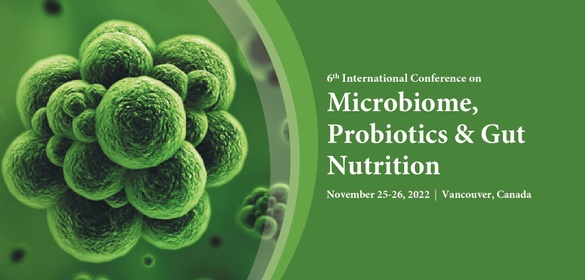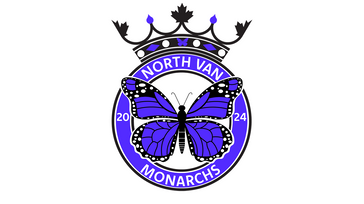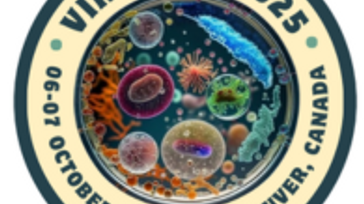
6th International Conference on Microbiome, Probiotics and Gut Nutrition,

-
About the event
Joshua Lederberg, who coined the term “Microbiome”, to signify the ecological community of commensal, symbiotic, and pathogenic microorganisms that literally share our body space.
A microbiome is the community of microorganisms such as bacteria, achaea, fungi, as well as viruses that inhabit an ecosystem or organism. Microorganisms dominate all other life everywhere scientists have looked, including the human body, the Earth’s soils and sediments, the oceans and fresh waterways, the atmosphere and even extreme environments such as hydrothermal vents and sub glacial lakes. Scientists also use the term microbiome to refer to all these genes associated with those life forms.
We, humans, are mostly microbes, over 100 trillion of them. Microbes outnumber our human cells ten to one. The majority live in our gut, particularly in the large intestine. The number of genes in all the microbes in one person’s microbiome is 200 times the number of genes in the human genome. The microbiome may weigh as much as five pounds; Microbiomes have several things in common. Their inhabitants are plentiful and diverse, varying from place to place and even from person to person. They are also dynamic, changing in response to factors such as diet or climate. Finally, they are interconnected with their host, engaged in a give-and-take relationship that is often beneficial, even essential, to both the host and their resident microorganisms.
Both inside and out, our bodies harbor a huge array of micro-organisms. While bacteria are the biggest players, these are dubbed the human microbiota. Your body’s microbiome is all the genes your microbiota contains. The bacteria in the microbiome help digest our food, regulate our immune system, protect against other bacteria that cause disease, and produce vitamins including B vitamins B12, thiamine and riboflavin, and Vitamin K, which is needed for blood coagulation.
Microbiome: The complete genetic content of the microbiota
What is meant by Microbiota?
A microbiota includes bacteria, archaea, protists, fungi, and viruses. A microbiota is an "ecological community of commensal, symbiotic and pathogenic microorganisms" found in and on all multicellular organisms studied to date from plants to animals. The synonymous term microbiome describes either the collective genomes of the microorganisms that reside in an environmental niche or the microorganisms themselves
Aren’t microbes supposed to be dangerous?
Some are pathogens, but others only become harmful if they get in the wrong place or boom in number, and some are very useful to the body such as by helping to break down the array of sugars found in human breast milk. “These sugars are not broken down by the infant,” other key roles of our microbes include programming the immune system, providing nutrients for our cells and preventing colonization by harmful bacteria and viruses.
Where do microbes come from?
We are sterile when we are in utero, and as we are being born, as we emerge through the birth canal from our mums, we get these handover bacteria. It is like a gulp at birth. Those bacteria are really important for starting the whole process during pregnancy a mother’s microbiome shifts, apparently to an optimum mix for offspring. If you are not born by vaginal delivery but are born by cesarean section, things start off being different
Why microbiome become such a hot topic for research?
As researchers begin to understand what constitutes a healthy microbiome, they are also learning how imbalances in microbial communities can cause disease and how to restore the balance as a means of treatment. There are strong associations between the human gut microbiome and conditions including obesity, type-2 diabetes, cirrhosis, rheumatoid arthritis and inflammatory bowel disease. Researchers have already restored the “normal” human gut microbiome using fecal transplants to cure recurrent infections with the bacterium Clostridium dificial. There are still other associations between the gut microbiome and disorders including anxiety, depression, and autism that researchers are still exploring.
Researchers are just beginning to study the microbiomes in a systematic way. They are trying to understand what makes a healthy microbiome, including what microbes are present and what those microbes are doing, as well as how microbiomes change over time, how such communities stay balanced and how changes to microbiomes impact human or environmental health. Microbiome research is even important for space exploration and planetary science which indulges more interest towards the Microbiome research.
Where do microbiomes exist?
The microbiome varies greatly among
The Human Microbiome:
The microbiome is essential for human development, immunity, and nutrition. It is the collection of trillions of microbes living in and on the human body. It consists of about a thousand different bacterial species that reside in the mouth, gut, and vagina, and on the skin. These microbes and the genes they express make us a “super organism” composed of human and microbial cells.
The Earth Microbiome:
The Earth’s soils host microbial communities. Diversity in these underground habitats is tremendously high, with estimates of the soil microbial soil, researchers have found that microbes are essential for supporting plant life, mediating uptake and entry of nutrients into the food chain, cycling carbon, nitrogen, and breaking down pollutants.
The Ocean Microbiome:
Ocean Microbes remove most of the methane from the world’s oceans. These tiny organisms are highly specialized and optimized for their environment, where they provide energy and chemical building blocks to larger life forms. They also produce half of the oxygen we breathe and recycle about the same proportion of carbon dioxide from the atmosphere. The extremely small organisms or “nanoplankton” that perform these essential services form the “nanobiome.”
The Atmospheric Microbiome:
Even the atmosphere has a microbiome. Microbes in the atmosphere are everywhere, vary from place to place and can remain suspended for weeks. The atmosphere transports these microbes, either freely or attached to particles such as dust, around the globe, a phenomenon that may impact agriculture, infectious disease, human health, clouds, precipitation and the water supply.
Researchers mapping the microbiome are discovering previously as an uncharted species and genes. The conviction for a central role of microbiology in the life sciences has been growing exponentially, and microbial symbiosis is advancing from a subdiscipline to a central branch of knowledge in the life sciences.
Why should you sponsor?
Microbiome 2022 Conference is a multidisciplinary program with broad participation with members from around the globe focused on learning about microbiology research and its advances. This is your best opportunity to reach the largest assemblage of participants from microbiology community that is from academia, microbiology entities, medical groups, labs, related associations, societies and also from government agencies, pharmaceutical, biomedical and medical device industries. This conference conduct presentations, distribute information, meet with current and potential scientists, make a splash with new clinical research developments, and receive name recognition at this 2-days event. World-renowned speakers and the most recent techniques, developments, the newest updates in Microbiome, Probiotics and Gut Nutrition are hallmarks of this conference.
James WilsonMeet Inspiring Speakers and Experts at our 3000+ Global Events with over 1000+ Conferences, 1000+ Symposiums and 1000+ Workshops on Medical, Pharma, Engineering, Science, Technology and Business.
Contact the Organizer Contact the OrganizerMore Info
-
1-50 attendees expected
50% Male Attendees
50% Female Attendees
Contact the Organizer
Select a Package
3 available packages from C$5000 to C$10000
https://www.sponsormyevent.com/6th-international-conference-on-microbiome-probiotics-and-gut-nutrition-richmond
10 available
10 available
10 available

